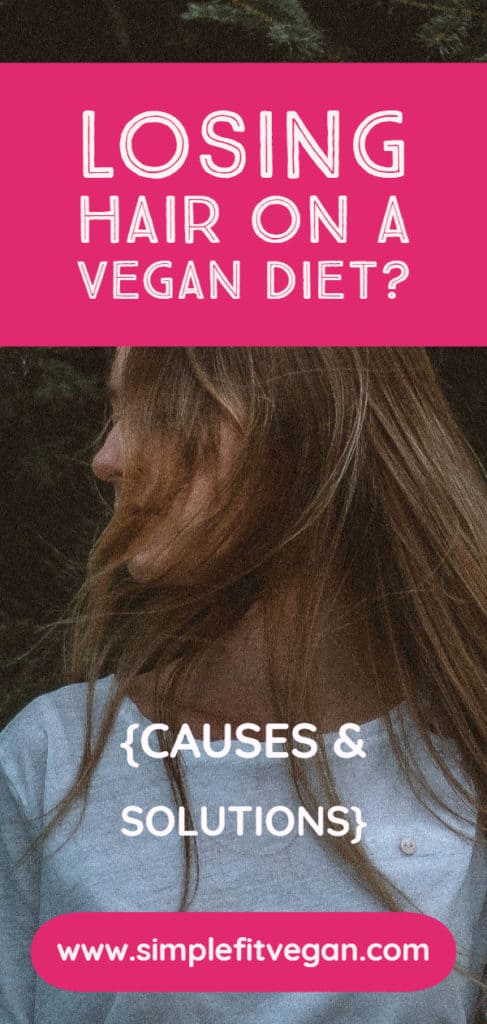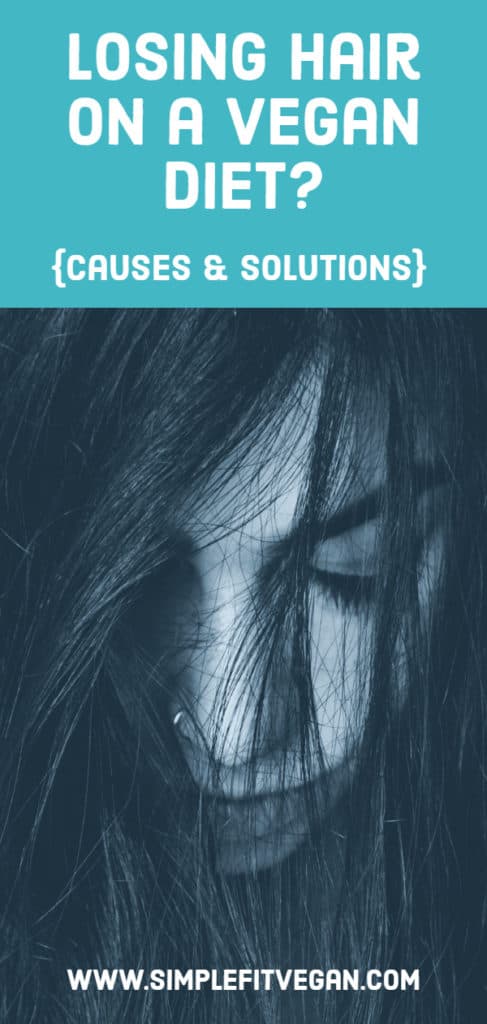My brand new cookbook is out on Amazon! It’s called “30-Minute Plant-Based Recipes” and it’s perfect for busy vegans. Grab it now!

Can a plant-based lifestyle cause you to lose hair?
The short answer is – yes it can. Technically, many things can cause hair thinning or hair loss.
A vegan lifestyle doesn’t cause hair loss directly in all people. Rather, a lack of nutrients resulting from an inadequate vegan lifestyle can lead to hair loss.
Let’s dig a little deeper into this.
I did some research in medical articles published online on this topic and here’s the summary of findings.
Iron – iron deficiency is a well-known cause of hair loss. Since the iron in plant food sources (a.k.a. non-heme iron) is absorbed by the body at a lower rate than iron in animal products, a poor vegan diet can lead to deficiency. Keep in mind that the recommended daily intake of iron is higher for vegan compared to non-vegans, 18 mg for women of childbearing age and 8 mg for men and postmenopausal women.
Consume iron-rich foods such as beans, soy foods, lentils, seeds, dried fruit, and leafy greens. Consuming vitamin C, such as orange juice, along with iron-rich foods, enhances iron absorption.
There’s been some conflicting research linking iron deficiency to hair loss directly. Nevertheless, iron deficiency should be considered if you’re experiencing hair loss.
Zinc – is an essential mineral required by hundreds of enzymes in your body. Zinc is certainly present in plants like chickpeas and lentils, but the bioavailability of zinc is lower in plants than meat. In other words, zinc present in plants isn’t well absorbed by the body. Low levels of zinc may cause hair loss.
Protein – yes, my friends, low protein levels can cause hair loss. Many plants are not complete protein sources (i.e. do not contain all 8 essential amino acids). If you aren’t watching your diet and not consuming a balanced variety of plant protein sources, you may easily slip and be way under your protein intake for the day.
A poor plant-based diet can result in all sorts of vitamin and nutrient deficiencies. It’s important to pay attention to your body and what you eat to avoid these deficiencies.
My personal story
I suffered hair loss last fall, a little over a year into my vegan journey. My first response was to PANIC! I’ve always had thick, wavy hair, which I, sometimes, hated for being so unruly.
Oh, how mad I was! All I wanted to grow my hair back.
It’s also worth mentioning that I had been doing keratin treatments for two years up to that point and bleaching my hair. I’m not sure if that may have been the cause or maybe a combination of both keratin/bleaching and lack of nutrients.
I upped my protein intake because after I tracked what I ate in a day, that is what I lacked. I started to have more tofu, adding protein powder to shakes or just having it with nut milk every day. I started to track and pay closer attention to what I ate to make sure I was getting all the nutrients. This is how my vegan nutrition mini-course came about.
I also started making hair masks once a week, mostly using coconut oil or castor oil.
This all helped. My hair has grown back and it feels much better. I still bleach it, but that’s another story!
If you’d like to know more on vegan hair loss, here’s the medical research article I found online: https://www.ncbi.nlm.nih.gov/pmc/articles/PMC5315033/
My brand new cookbook is out on Amazon! It’s called “30-Minute Plant-Based Recipes” and it’s perfect for busy vegans. Grab it now!

Juliet
How long after making changes did your hair start growing back? The stress definitely doesn’t help :/
Nara
Hi Juliet, it took a month or two, and it came back to normal after about 6 months.
Eva
What did you use to track your protein intake?